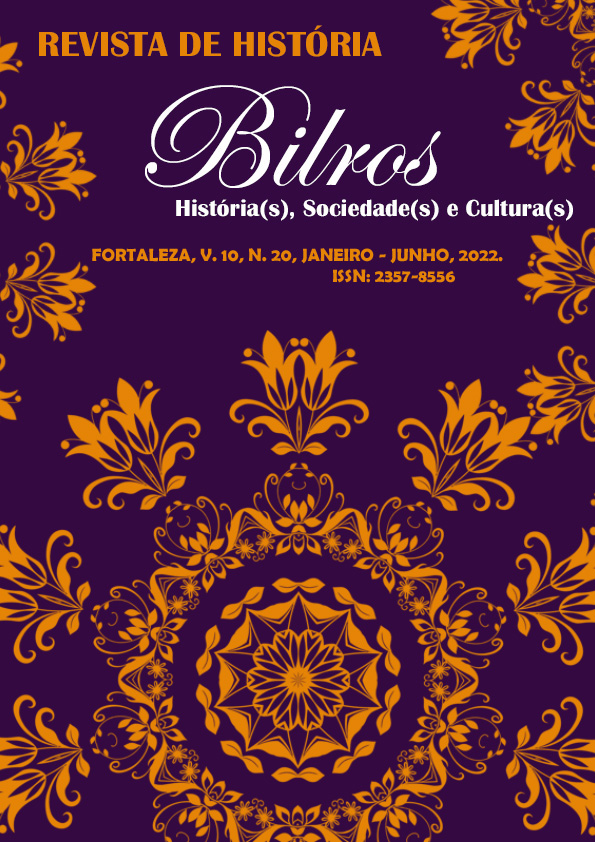MUSEU MALVINAS E ILHAS DO ATLÂNTICO SUL:
ENTRAVES NARRATIVOS E CRÍTICA DESCOLONIAL QUARENTA ANOS APÓS O CONFLITO(1982-2022)
Keywords:
Malvinas, Falklands, decoloniality, British Empire, Latin AmericaAbstract
This article examines the Malvinas Museum and South Atlantic Islands, located in the Argentine capital. The institution seeks to intertwine physical aspects (bio bielogy, geology and related issues) with human issues (geography, history), reaffirming the thesis of Argentine sovereignty over the South Atlantic archipelago. In doing so, it seeks to criticize European imperialism, particularly British imperialism, promoting a debate that goes beyond the dispute, also incorporating a regional (Latin American) perspective on the issue. However, it is argued that the narrative adopted by the Buenos Aires museum, by reaffirming Eurocentric instruments, such as the Treaty of Tordesillas, as well as nationalist references, such as heroes of Argentine independence, ends up reinforcing a European narrative of domination. This perspective ignores native peoples and subalternized groups, such as black communities in the Americas. Although the critique of European imperialism is obvious and necessary, the institution's response uses concrete and symbolic instruments very similar to those historically adopted by European countries and their allies. This article also considers aspects of so-called "shadow tourism", juxtaposing theoretical concepts of the niche in order to analyze the Argentine institution. It concludes that the museum plays an important role in bringing educational contributions to the general public, while missing the opportunity to incorporate inclusive and effectively decolonial perspectives.
References
AHMAD, A. In theory: classes, nations, literatures. Repr ed. London: Verso, 2000.
AMAR, Paul. Insurgent African Intimacies in Pandemic Times: Deimperial Queer Logics of China’s New Global Family in Wolf Warrior 2. Feminist Studies, v. 47, n. 2, p. 419–448, 2021.
ARMITAGE, D. Three Concepts of Atlantic History. Em: ARMITAGE, D.; BRADDICK, M. J. (Eds.). The British Atlantic world, 1500-1800. Houndmills, Basingstoke, Hampshire; New York: Palgrave Macmillan, 2002. p. 13–29.
BERNARDINO-COSTA, J.; GROSFOGUEL, R. Decolonialidade e perspectiva negra. Revista Sociedade e Estado, v. 31, n. 1, p. 15–24, 2016.
CECATTO, A. A História Atlântica como possibilidade de abordagem metodológica para os estudos do Atlântico e o ensino de História da África. Temporalidades – Revista de História, v. 9, n. 1, p. 167–183, 2017.
CHAKRAVARTI, Ananya. Caste Wasn’t a British Construct – and Anyone Who Studies History Should Know That. The Wire, 2019. Disponível em: <https://thewire.in/caste/caste-history-postcolonial-studies>. Acesso em: 14 jun. 2022.
CHARLEAUX, J. P. Como Barbados se tornou a mais nova república do mundo. Nexo, 30 nov. 2021. https://www.nexojornal.com.br/expresso/2021/11/30/Como-Barbados-se-tornou-a-mais-nova-rep%C3%BAblica-do-mundo; Acesso em 19 de maio de 2022.
CINTRA, J. P. O mapa das cortes e as fronteiras do Brasil. Boletim de Ciências Geodésicas, v. 18, n. 3, p. 421–445, 2012.
CUSICANQUI, S. R. Ch’ixinakaxutxiwa : A Reflection on the Practices and Discourses of Decolonization. South Atlantic Quarterly, v. 111, n. 1, p. 95–109, 1 jan. 2012.
DANN, G. M. S.; SEATON, A. V. Slavery, Contested Heritage and Thanatourism. International Journal of Hospitality & Tourism Administration, v. 2, n. 3–4, p. 1–29, 23 out. 2001.
EDWARDS, E. D. Hiding in plain sight: Black women, the law, and the making of a white Argentine Republic. Tuscaloosa: The University of Alabama Press, 2020.
FOLEY, M.; LENNON, J. J. JFK and dark tourism: A fascination with assassination. International Journal of Heritage Studies, v. 2, n. 4, p. 198–211, dez. 1996.
FORSDICK, C. The Oxford Handbook of Postcolonial Studies. Em: HUGGAN, G. (Ed.). .Postcolonializing the Americas. Oxford: Oxford University Press, 2013. p. 648–668.
FRAGOSO, J.; GUEDES, R.; KRAUSE, T. A América portuguesa e os sistemas atlânticos na Época Moderna: Monarquia pluricontinental e Antigo Regime. Rio de Janeiro: Editora FGV, 2013.
GONÇALVES, A. F. S. Dark Tourism – O lado sombrio do turismo: Aplicação à cidade do Porto. Dissertação de Mestrado —Porto, Portugal: Instituto Politécnico do Porto, 2017.
GRINBERG, K. Fronteiras, escravidão e liberdade no sul da América. Em: As fronteiras da escravidão e da liberdade no sul da América. Rio de Janeiro: 7 Letras, 2013. p. 7–24.
GURIDY, F.; HOOKER, J. Currents in Afro-Latin American Political and Social Thought. Em: DE LA FUENTE, A.; ANDREWS, G. R. (Eds.). Afro-Latin American Studies: An Introduction. Cambridge: Cambridge University Press, 2018. p. 222–264.
JACKSON, G. The British whaling trade. St. John’s, Nfld: International Maritime Economic History Association, 2005.
KRISJANOUS, J. An exploratory multimodal discourse analysis of dark tourism websites: Communicating issues around contested sites. Journal of Destination Marketing & Management, v. 5, n. 4, p. 341–350, dez. 2016.
MIGNOLO, W.; WALSH, C. E. On decoloniality: concepts, analytics, praxis. Durham: Duke University Press, 2018.
PEREIRA, T. Motivações para a prática do dark tourism. ACENO - Revista de Antropologia do Centro-Oeste, v. 7, n. 14, p. 215–230, 22 dez. 2020.
RABELLO SODRÉ, J. G. Espaços Subalternos e Imaginários Diaspóricos no Cais do Valongo. Em: PURIFICAÇÃO, M. M.; CATARINO, E. M.; OLIVEIRA, P. M. P. DE (Eds.). Antropologia e crítica social: visão crítica da realidade sociocultural. Ponta Grossa: Atena, 2021.
ROJEK, C. Ways of escape: modern transformations in leisure and travel. Basingstoke: Macmillan, 1993.
SANTOS, B. DE S. Uma concepção multicultural de direitos humanos. Lua Nova: Revista de Cultura e Política, v. 39, 1997. https://doi.org/10.1590/S0102-64451997000100007; Acesso em 23 de maio de 2022.
VASSALLO, S.; CICALO, A. Por onde os africanos chegaram: o Cais do Valongo e a institucionalização da memória do tráfico negreiro na região portuária do Rio de Janeiro. Horizontes Antropológicos, v. 21, n. 43, p. 239–271, jun. 2015.
VOYLES, T. B. Wastelanding: Legacies of Uranium Mining in Navajo Country. Minneapolis: University of Minnesota Press, 2015.
WOLF, E. R. A Europa e os povos sem história. São Paulo: EDUSP, 2005.







